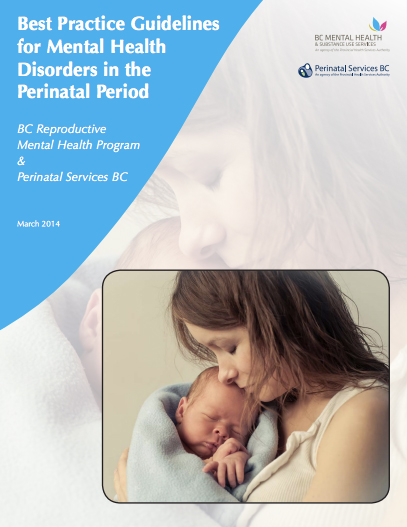New Guidelines for Mental Health Disorders in the Perinatal Period
 The Best Practice Guidelines for Mental Health Disorders in the Perinatal Period manual for healthcare clinicians caring for women during their reproductive years (The BC Reproductive Mental Health Program and Perinatal Services BC, March 2014), describes best practices for the care of women with depression, anxiety disorders, bipolar disorder and psychotic disorders, including postpartum psychosis, in the perinatal period.
The Best Practice Guidelines for Mental Health Disorders in the Perinatal Period manual for healthcare clinicians caring for women during their reproductive years (The BC Reproductive Mental Health Program and Perinatal Services BC, March 2014), describes best practices for the care of women with depression, anxiety disorders, bipolar disorder and psychotic disorders, including postpartum psychosis, in the perinatal period.
As many as one in five women in BC will experience a mental health disorder during the perinatal period (pregnancy up to one year postpartum). Such disorders affect all aspects of a woman’s life, as well as that of her baby and family. The risks of untreated perinatal depression can include compromised prenatal care, increased risk of obstetrical complications, self-medication or substance use, compromised mother/infant interactions and cognitive, emotional and behavioural impairments in the developing child. The most tragic consequences of untreated perinatal depression are maternal suicide and infanticide.
Although mental illness is serious, with the right strategy and a coordinated approach, it can be detected early and effectively treated. The purpose of this guideline is to support healthcare clinicians in this early detection and coordinated treatment of pregnant and postpartum women with mental health challenges.
The guidelines focus particularly on the four most common mental health disorders in the perinatal period (with a separate section on Suicide and Infanticide):
- Depression
- Anxiety disorders
- Bipolar disorder
- Psychotic disorders and postpartum psychosis
Mental health disorders are a significant cause of disability for women in the perinatal period (conception through to one year postpartum). As many as one in five women in BC will experience significant depression and/or another mental health disorder during their pregnancy and/or in the postpartum period. Unfortunately, only a small proportion will seek help.
Mental illness affects all aspects of a woman’s life and that of her baby and partner/family. Without treatment, it can contribute to compromised prenatal care, increased risk of obstetrical complications, self-medication and/or substance related disorders, compromised mother-infant interactions and cognitive/neuro behavioural impairments in the early years. The most tragic consequences are maternal suicide and infanticide.
Although mental illness is serious, with the right strategy and a coordinated approach, it can be detected early and effectively treated.
Addressing Perinatal Depression: A Framework for BC’s Health Authorities provides a framework to improve the recognition, diagnosis, treatment and follow-up care for women affected by perinatal depression. This guideline, Best Practice Guidelines for Mental Health Disorders in the Perinatal Period, applies the principles and pillars of action identified in the perinatal depression (PND) framework to other mental health disorders which occur in the perinatal period, namely anxiety disorders, bipolar disorder and psychotic disorders.
Four pillars of action are identified in the Framework
- Education and Prevention
- Screening and Diagnosis
- Treatment and Self-Management
- Coping and Support Networks
This guideline is intended for healthcare clinicians and describes best practices in each of the pillars for the care of women with depression, anxiety disorders, bipolar disorder and psychotic disorders in the perinatal period (conception through to one year postpartum), including postpartum psychosis.
The goal of the guideline is to promote collaborative and supportive care of women/mothers with mental health disorders and their babies and families by healthcare providers during this critical period of the life cycle.
This guideline is divided into 8 sections:
- Introduction
- Mental Health Disorders in the Perinatal Period (prevalence and clinical significance)
- Perinatal Depression
- Anxiety Disorders
- Bipolar Disorder
- Psychotic Disorders and Postpartum Psychosis
- Suicide and Infanticide
- Coping and Support Networks